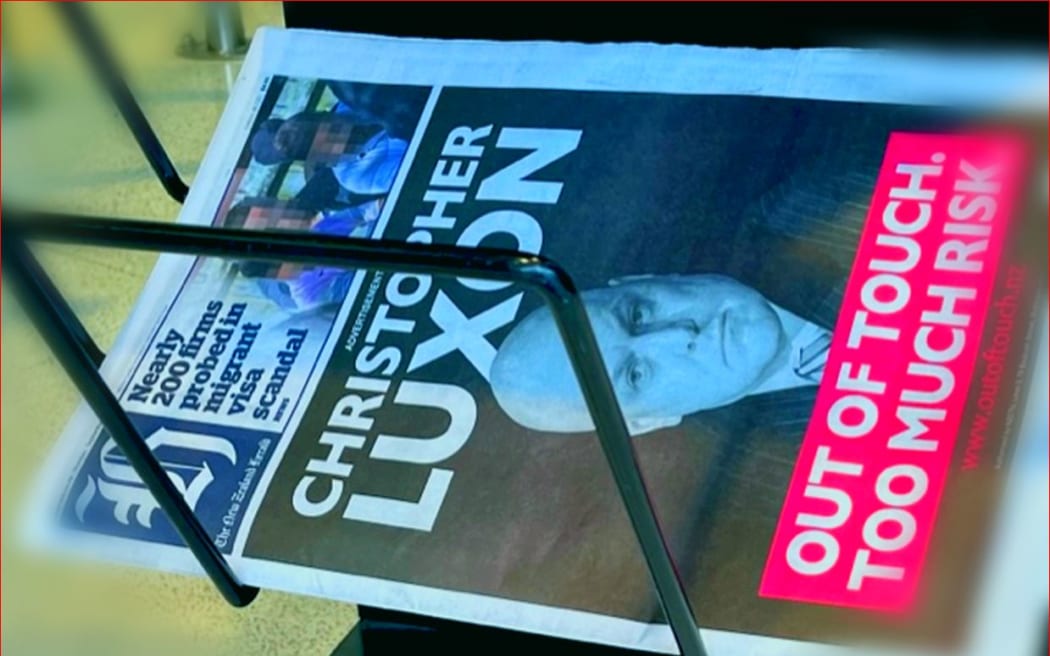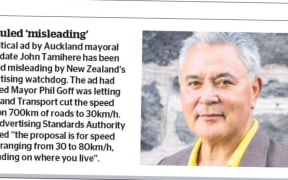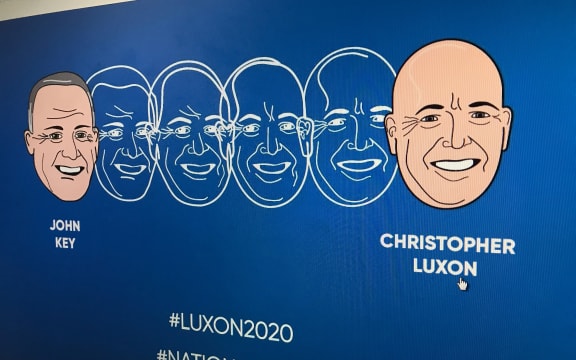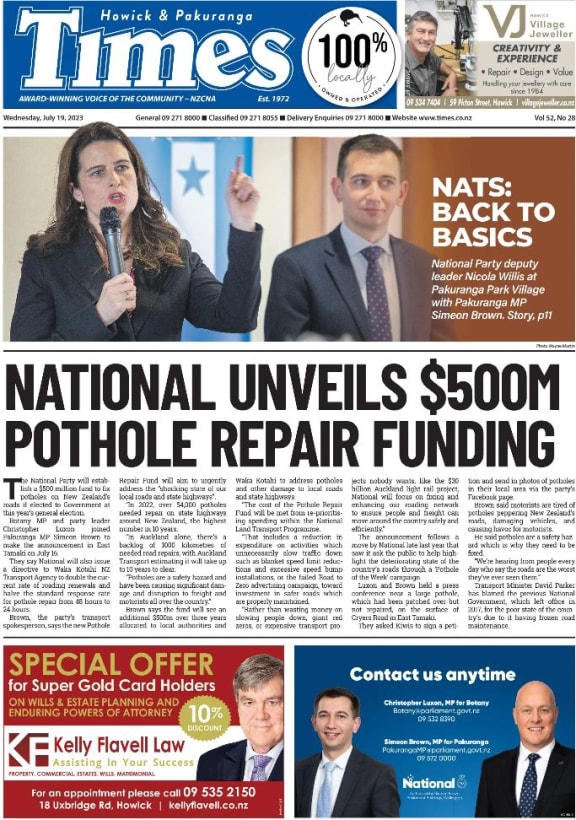The Herald copped criticism for publishing a front-page attack ad targeting the National Party leader this week - but it was far from the first time ads like it have appeared in print. Meanwhile questions were asked about other coverage that looked like it might be taking sides as the official campaign period begins.

The CTU's controversial front page advocacy ad in the New Zealand Herald. Photo:
“You’ve got to survive in the media. You got to take the ads," Newstalk ZB morning host Kerre Woodham told listeners last Monday, explaining the the controversial Council of Trade Union ad labelling the National Party leader “out of touch and too risky".
It was clearly an election advocacy ad - and it was identified as such in the Herald. But as soon as the ad came through the NZME ad department, the senior editors there must have known devoting the front page to it would become a news story.
The afternoon host at the Herald’s NZME stablemate NewstalkZB, Andrew Dickens, certainly thought so.
“I think this is news. This is why I'm talking about it on the radio. I'm not involved with this decision. . . but I think they need to write about it and say how they actually determine who gets the ‘wraparound’,” he told his listeners.
The Herald top brass wasn’t keen on that, but election ads on the front page aren't entirely unprecedented.
A former Herald editor, Tim Murphy, pointed out the Weekend Herald has allowed the National Party to add detachable blue stickers late in previous campaigns.
And once papers opened the door to wraparound front-and-back page ads for retailers (who paid a pretty penny for them during the Covid-19 crisis), it was only a matter of time before someone selling political messages rather than fridges took up the space as well.
The CTU ad was within the rules for political promotion by third parties. As long as they registered, they can spend the thick end of $400,000 on ads doing down political opponents if they want to.
Gordon Campbell on scoop.co.nz said that apart from the front-page spot, there was nothing really novel about an ad criticising a party leader who was actively campaigning as the embodiment of his party's policies.
And while the CTU's campaign also appeared on billboards and social media platforms the same day, it was its appearance on the front page of a paper obliged to cover the campaign fairly which raised eyebrows.
“This will probably backfire on the Herald,” Andrew Dicken told his listeners, at the same moment one texted in to say he had cancelled his subscription to the Herald because of it.
Andrew Dickens told his listeners NZME radio stations had rules too - and could not accept ads that are “false, wrong, or lies or defamatory.”
Newstalk ZB found that out back in 2019, when it ran a political ad in which Auckland mayoral candidate John Tamihere said no suburb will escape Auckland Transport's “crazy plan” to cut the speed limits on Auckland roads.
The Advertising Standards Authority said that claim was false and the campaign ad, which had run for two weeks, should be dropped.

The New Zealand Herald reports Newstalk ZB's ads for John Tamihere's election campaign were judged to be misleading. Photo: PHOTO / RNZ Mediawatch
NZME told the Authority it had presumed the client 's script and figures provided were correct.
“Our team has been reminded to be vigilant when accepting advocacy advertisements to avoid this from reoccurring," NZME said.
In other words, they promised to do fact checks before cashing cheques from people peddling political propaganda at election time.
But at that time, the Weekend Herald had just published another controversial political ad all about Christopher Luxon.
The half page ad showed former Prime Minister John Key morphing into Christopher Luxon in the style of Dick Frizzell’s famous ‘From Mickey to tiki” illustration.
Luxon was not even a member of the National Party at that point, let alone a candidate, but the client for that ad turned out to be property tycoon Steven Brooks, who really wanted Luxon to be the next party leader.
His involvement should have been declared on the ad, which had the appearance of unauthorised party political advertising.
Ads they didn't want

The ad is a reworking of Dick Frizzell's well-known artwork "Mickey to Tiki" showing John Key's face transforming into Christopher Luxon's. Photo: Weekend Herald
While that's all history now, Newstalk ZB listeners on Monday were also phoning concerns about ads that the Herald wouldn't print in the recent past.
They were part of a campaign from the lobby group Family First, which our three biggest newspaper publishers all declined to run.
Family First leader Bob McCoskrie has accused them of colluding to cancel the ad, which had the slogan: ‘What is a woman?’ and the website address for a campaign declaring it was “time to push back” against gender self-identification.
MoCoskrie said the ad departments of each publisher initially accepted the ad but editors subsequently decided they weren't fit to print.
But while the paper publishers exercised their right not to print the ads, they did go up on billboards in public.
Last month the Advertising Standards Authority complaints board upheld a complaint about them, ruling the ad was “misleading and not socially responsible,” but only because the identity of the advertiser - Family First - wasn't sufficiently clear for an advocacy ad.
From today, 10 September, until the day before the election we are in the official election period overseen by the Electoral Commission.
During this time special rules and a separate dedicated code of broadcasting practice apply to what are known as ‘election programs,’ defined as radio or TV advertisements by or for a party or candidate which encouraged voters to vote in particular ways or for particular parties or people.
Broadcasters and publishers will be paying extra attention to balance and fairness now, with the watchdogs running a fast-track process for complaints about seriously misleading claims and serious allegations.
Local MPs dominate local paper's coverage

One of several recent editions of the weekly Howick & Pakuranga Times featuring the area's two national MPs. Photo: supplied
While that Herald ad attacking Christopher Luxon startled some Herald readers last Monday, readers of another paper in Luxon’s own electoral backyard wondered whether it was leaning the other way.
The independently-owned weekly Howick-Pakuranga Times has been in print for more than 50 years, covering Pakuranga - whose MP is Natonal’s Simeon Brown - and Botany, represented by National Party leader Christopher Luxon since 2020.
Both MPs have featured heavily in the paper’s recent news coverage, alongside ads for Simeon Brown and regular columns by the pair.
The lead story in the 2 August edition reported Christopher Luxon had accused the Labour government of personal attacks against him when he kicked off his local campaign at a local high school.
On the facing page National’s just-launched transport policy was reported, quoting the party's transport spokesperson Simeon Brown and Christopher Luxon - but no-one else.
“National is getting serious about roads, and that is good news for Botany,” the National Party leader told readers in his column. But no other politician or political party or policy appeared anywhere else in that edition.
The following week Simeon Brown told readers Labour had “wasted six years on roads and National would deliver”.
On the facing page, a story announced Bo Burns as the local ACT Party election candidate for Botany against Luxon, but no other candidate got a mention in the story.
Christopher Luxon was also the only candidate mentioned (and also pictured along with his dad) in the following week’s lead story headlined 'The race for the Beehive is on'.
In the same edition, Christopher Luxon urged readers “not to fail our kids in education” in his own column, while another news story recorded National’s police spokesperson Mark Mitchell making a local speech about law and order alongside the local MP Simeon Brown.
“National will boost funding for more cancer treatments,” was the headline the following week for a story which had nothing about any other party up for election - or what anyone other than Christopher Luxon had to say about the cancer funding plan. The leader's message on this was restated in last week's issue of the Times in Luxon’s column.
Elsewhere under the headline, 'There's a real desire for change,' the paper profiled the Act party challenger for Simeon Brown in Pakuranga.
“Dr. Parmjeet Palma has a massive advantage over other candidates at this year's general election. The businesswoman and scientist can draw on the experience of having previously served as the list MP for the National Party from 2014 to 2020.”
A page two story urging people to enroll to vote did mention the names of other parties and candidates contesting the two electorates - and that Labour had topped the party vote tallies in both of them last time around.
In this week’s edition, Simeon Brown told readers “Kiwis will be better off under National’s prudent, costed tax plan,” and over the page, a report of another local Christopher Luxon speech featured this quote: “You're not helping us by voting for anyone else with the party vote.”
While some readers of the Times complained to Mediawatch this week, you might not know there was much choice if you relied on the news, the opinion columns and the ads in the paper lately.
Some wondered whether the paper had actually endorsed the National Party for the upcoming election - or whether the coverage of the party's candidates was tied to the sale of advertising.
The Times long-serving managing director Reay Neben told Mediawatch there's no political favoritism at the paper and never has been over more than 50 years and print.
“The fact is we cover local news. When the Labour government has made an announcement about a local project, such as Eastern Busway, we have covered that, but our two elected local National MPs talk about the local issues far more frequently than the current Labour government does,” she said.
“So of course, they will appear on our stories more often,” she said.
But she insists no political party is excluded from the paper.
She said local Labour list MP Naisi Chen did have a column in the paper for years, but not since June when she decided not to be a candidate this time around.
“All political parties and candidates have been approached for advertising. But so far, none have come back except for the existing contract we have with Simeon and Chris as local MPs. We would love it if more candidates and parties advertised with us,” Reay Neben told Mediawatch.
Most newspaper publishers would love that too.
But now we're in the official election period, can the Times' readers expect more news coverage and opinion reflecting the views of political parties other than National, even if they're not quite as active locally?
Neben who pointed out to Mediawatch to the two recent stories on Act’s local candidates - and she said the paper’s political reporter has interviewed Labour's Pakuranga candidate and approached Labour's Botany candidate. He's doing upcoming stories about minor party candidates too.
The same day (last Thursday), the Times website published a new story about Labour proposing to beef up legal protections against stalking and harassment - part of Labour's latest law and order election policy announcements.
Neben also pointed out to us that the Greens and New Zealand First had no candidates in Pakuranga and Botany.
But while there may not be a lot of other campaigning going on in an area where the National Party's MPs seem to have their seats sewn up, party votes are still up for grabs.
Reporting politics - even locally - shouldn't be driven just by what the most active politicians and their parties are prepared to say, especially when one party is the paper’s only political advertiser.


